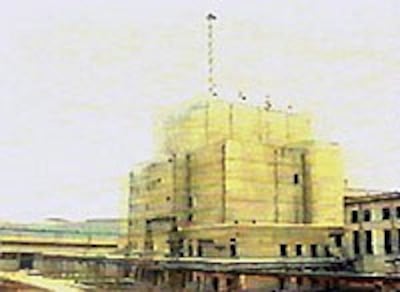
SEOUL—South Korea says it believes the North Korean regime has shut down its main nuclear complex, which could indicate that Pyongyang is moving to extract more weapons-grade plutonium.
Kim Sook, director-general of North American affairs at South Korea's Foreign Ministry, told KBS Radio that his government had confirmed that North Korea has shut down its Yongbyon nuclear complex.
"We'll have to see what North Korea's intention or its future actions will be," Kim said.
Shut down, then reopened
"We have to take it seriously, and we need more time to analyze it. As far as I know, North Korea's suspension of the 5-megawatt reactor at Yongbyon has been confirmed through various channels to be true," he said.
Yongbyon houses a 5-megawatt reactor that generates spent fuel rods laced with plutonium, but they must be removed and reprocessed to extract the plutonium for use in an atomic weapon.
Nuclear weapons serve as [a] main deterrent to avert a war and ensure peace and security in the Korean Peninsula and the rest of Northeast Asia.
Rodong Sinmun
They can be removed only if the reactor has been shut down. The facility was shut down under a 1994 pact with the US, but Pyongyang reopened it in late 2002 amid escalating bilateral tensions.
Pyongyang warned in February that it had already developed nuclear weapons and wouldn't return to multilateral talks aimed at ending its nuclear program unless the United States changed its "hostile" attitude towards Pyongyang.
American North Korea expert Selig Harrison, who recently visited North Korea, said earlier this month that officials there told him they were preparing to unload fuel rods from the Yongbyon reactor during the next two months, adding to the urgency of resuming nuclear talks.
More capacity claimed
"They will have more plutonium unless there is a freeze," Harrison, a Washington-based researcher, said after his trip.
The North's official Rodong Sinmun newspaper said in a commentary Monday that the country's "nuclear weapons serve as main deterrent to avert a war and ensure peace and security in the Korean Peninsula and the rest of Northeast Asia," according to the North's state-run Korean Central News Agency.
In October 2003 the North said it had reprocessed 8,000 nuclear fuel rods at Yongbyon, which if true would have produced enough plutonium to make a handful of nuclear bombs.
International experts believe the North has reprocessed enough plutonium to build about a half-dozen nuclear bombs, but it hasn't performed any known atomic tests that would confirm its arsenal.
Original reporting by RFA’s Korean service, directed by Jaehoon Ahn. Produced for the Web by Sarah Jackson-Han.
